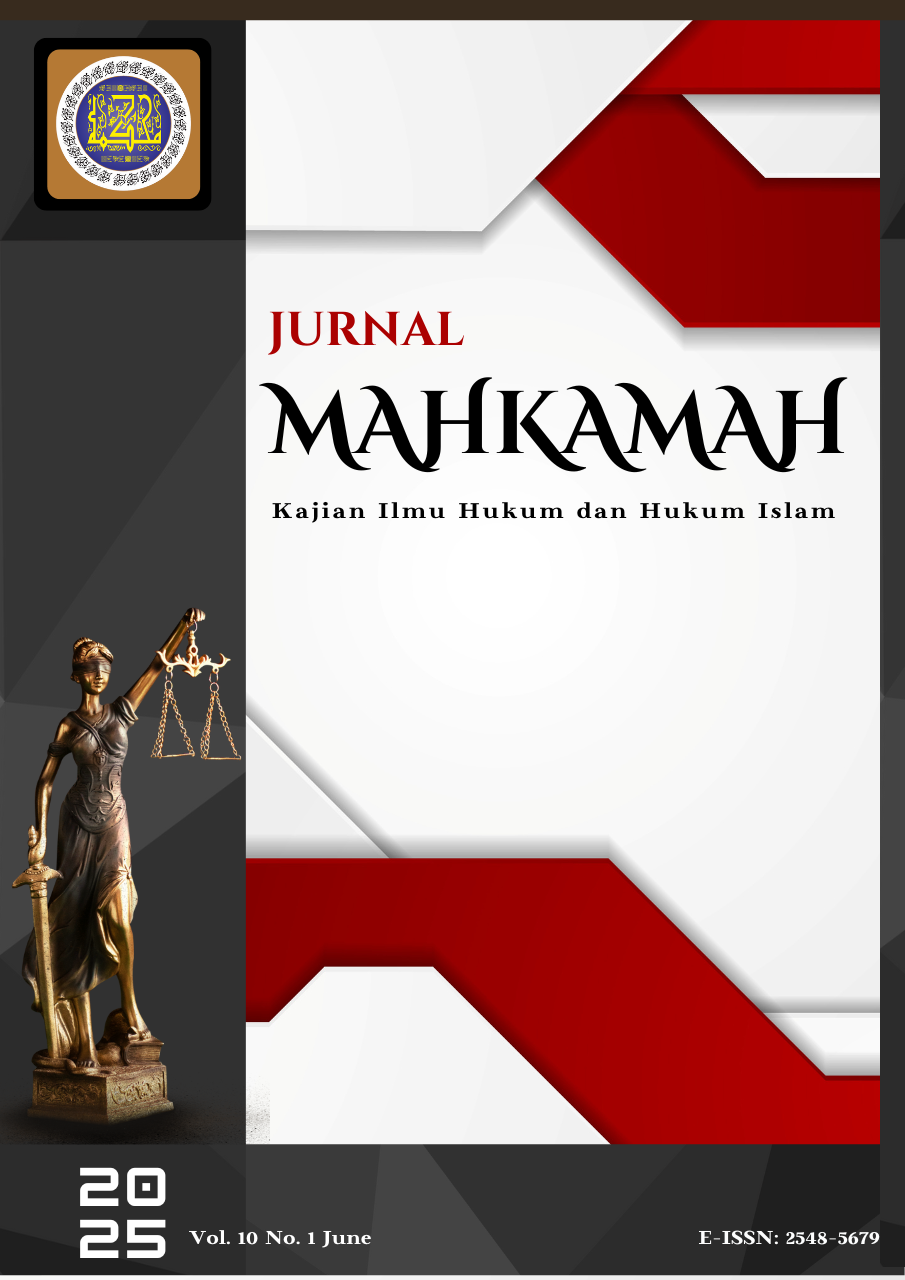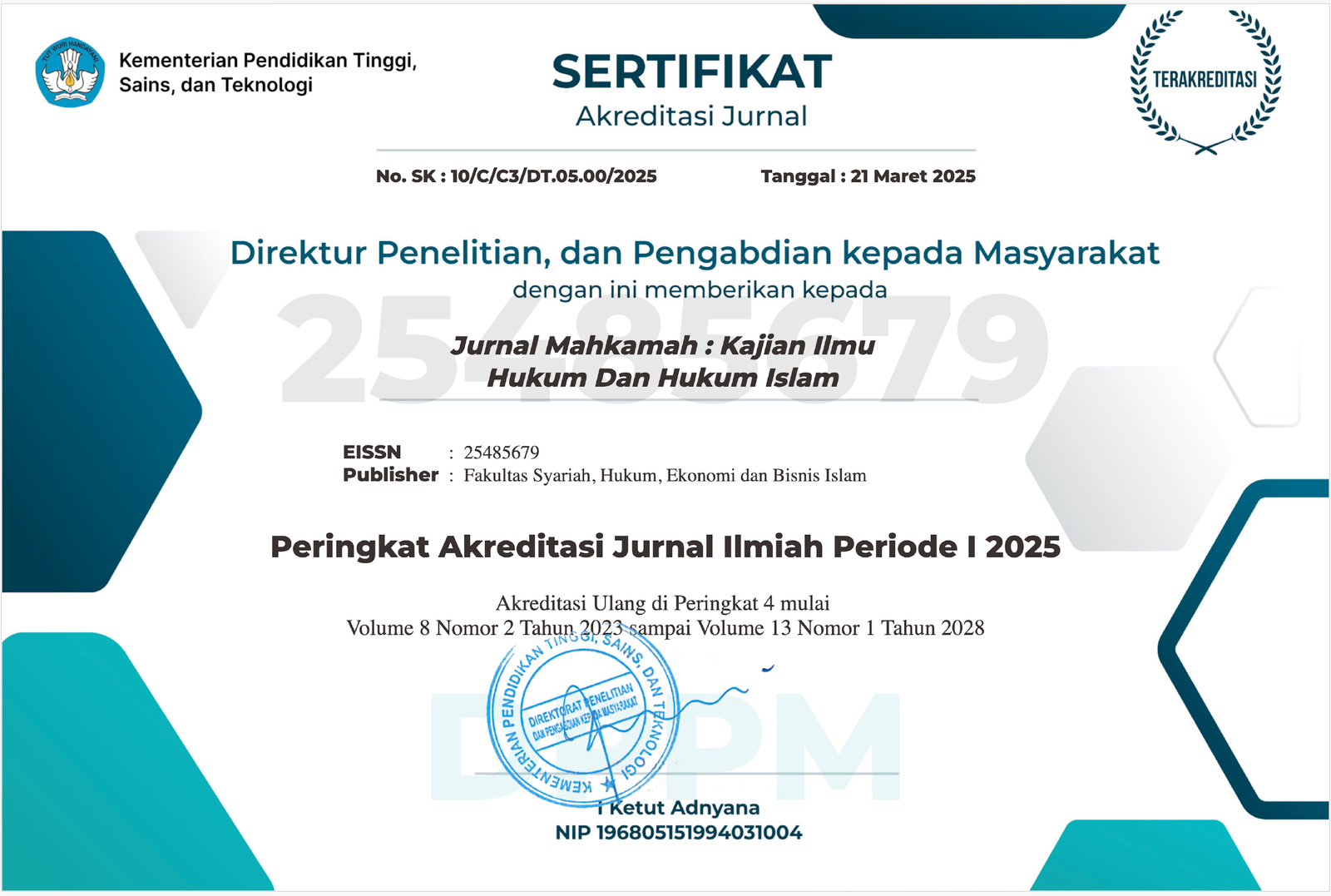The Practice of Nusyuz Among Tanjungbalai Tni from the Perspective of the Indonesian Ulama Council of Tanjungbalai (Case Study at Tni Lumba-Lumba Complex Tanjung Balai)
DOI:
https://doi.org/10.25217/jm.v10i1.6265Keywords:
Nusyuz, Indonesian National Army Soldier, Islamic lawAbstract
This study aims to examine the forms of behavior and factors that cause nusyuz among the TNI in the review of Islamic law as well as how the TNI Council's settlement mechanism for nusyuz behavior. The urgency of this problem lies in the complexity of TNI household relationships that often face challenges due to heavy military duties and have an impact on family harmony. Based on this background, this research uses a qualitative method with a legal sociology approach, where primary data is obtained through interviews while secondary data comes from Islamic legal literature and previous research results. The results show that the wife's disobedience in the TNI household does not necessarily make the wife immediately blamed, but it is necessary to first investigate the causes, including the possibility of the husband's actions triggering the disobedience. In the legal process, the wife's rights are still protected until the official divorce decision is issued. This research emphasizes that the concept of nusyuz in the context of the TNI requires a fair legal approach and clear procedures.
References
Abdurrahman. (1992). Kompilasi hukum Islam di Indonesia (Ed. 1). Akademika Pressindo.
Ahmad Furqan Darajat. (2017). Tipologi Relasi Suami Istri dan Indikator Terjadinya Nusyuz. TAFAQQUH, 2(2), 54–67. https://doi.org/10.70032/ad830b31
Akbar Syahru Rama & Murni Murni. (2024). Analisis Konsep Nusyuz dan Implikasinya dalam Perkara Perceraian di Pengadilan Agama Surabaya. Referendum : Jurnal Hukum Perdata Dan Pidana, 1(4), 50–59. https://doi.org/10.62383/referendum.v1i4.260
Al-Jamal, A. ‘Ubaidah U. B. M. (2010). Shahih Fiqh Wanita Muslimah. Insan Kamil.
asad, aly. (2010). Terjemah: Fath al-mu’in. Pustaka Alawiyah.
As-Sabuni, M. ’Ali. (1980). Rawaiu al-Bayan Tafsir Ayat Al-Ahkam min Al-Qur`an. Rawaiu al-Bayan Tafsir Ayat Al-Ahkam min Al-Qur`an.
Azizah, J. N. (2024). Konsep Nusyuz dalam Khi dan Penyelesainya Prespektif Mubadalah. UNES Law Review, 6(3), 8912–8920. https://doi.org/10.31933/unesrev.v6i3.1783
Badawi, M. H. (2020). Nusyuz Dalam Perspektif Hadits-Hadits Ahkam. Jurnal Hukum Islam Dan Pranata Sosial Islam, 06(1), 1. https://doi.org/10.30868/am.v8i1.696
Bukhary. (2003). Shahih Bukhory. Dar Ibn Hazm.
Dumais, A. D. G., & Rahaditya, R. (2023). Implementasi Pemberatan Pemidanaan Terhadap Anggota Tni Yang Melakukan Tindak Pidana Asusila. UNES Law Review, 5(4), 2974-2982. https://doi.org/10.31933/unesrev.v5i4.629
Eko, B. S. (n.d.). Hukum Disiplin Prajurit Tentara Nasional Indonesia/Militer Pada Komando Distrik Militer 0807/ Tulungagung. Yustitiabelen, 3(2), 2017. https://doi.org/10.36563/yustitiabelen.v3i1.130
Engineer, A. A. (2003). Matinya Perempuan: Transformasi al-qur’an, perempuan dan masyarakat modern. IRCiSoD.
Fadillah, R., & Syahruji, S. (2023). Hak Cerai Bagi Perempuan Dan Faktor Penyebabnya: Divorce Rights For Women And Causing Factors. Mitsaqan Ghalizan, 3(1), 1–15. https://doi.org/10.33084/mg.v3i1.5449
Hanapi, A., & Wahyuni, Y. S. (2021). Pandangan Masyarakat Terhadap Nusyuz Dan Implikasinya Terhadap Relasi Suami-Istri. Gender Equality: International Journal of Child and Gender Studies, 7(1), 125–134. https://jurnal.ar-raniry.ac.id/index.php/equality/article/view/8692/5282
Kamilia, N. (2024). Peran Tni Angkatan Darat Dalam Membangun Ketahanan Keluarga (Studi Kasus Perumahan Sokowaten Sorowajan Baru Banguntapan Bantul Yogyakarta). Al-Usroh : Jurnal Hukum Keluarga Islam, 2(01), 18–28. https://doi.org/10.55799/alusroh.v2i01.379
Kusumastuti, A., & Khoirun, A. M. (2019). Metode Penelitian. Lembaga Pendidikan Sukarno Pressindo.
Munawir, A. W. (1979). Al-Munawir. Pustaka Progresif.
Nuruddin, A., & Tarigan, A. A. (2004). Hukum Perdata Islam di Indonesia. Prenada Media.
Putra, M. H. A., & Sumbulah, U. (2020). Memaknai Kembali Konsep Nusyuz Dalam Kompilasi Hukum Islam Perspektif Gender & Maqashid Syariah Jasser Auda. Egalita, 15(1). https://doi.org/10.18860/egalita.v15i1.10179
Rambe, K. M., & Isfahani, F. (2018). Psikologi Keluarga Islam. CV Manhaji.
Saebani, B. A. (2001). Fiqh Munakahat 2. CV Pustaka Setia.
Solianti, R., Nurasiah, & Ravico. (2023). Nusyuz Dalam Perspektif Al-Quran ( Studi komparatif Tafsir Ibn katsir dan Quraish Shihab),. JurnaL Riset Dan Publikasi Mahasiswa, 3(1), 1. https://ejournal.iainkerinci.ac.id/index.php/thullab/article/view/2646
Syahputra, A. (2011). Hukum Perdata Indonesia. Cipustaka Media Perintis.
Syarifuddin, A. (2016). Hukum Perkawinan Islam di Indonesia Antara Fiqh Munakahat dan Undang- Undang Perkawinan. Kencana Prenadamedia Group.
Ulfa, M. (2021). Hubungan Dukungan Sosial Terhadap Adaptasi Stress Istri Tniad Saat Suaminya Bertugas Di Daerah Rawan Konflik. Media Husada Journal of Nursing Science, 2(2), 13–20. https://doi.org/10.33475/mhjns.v2i2.41
Yudha, T. D. P. (2018). SANKSI PELAKU NUSYUZ (Studi Pandangan Mazhab Syafi’i & Amina Wadud). Jurisprudensi: Jurnal Ilmu Syariah, Perundang-Undangan Dan Ekonomi Islam, 9(2), 23–49. https://doi.org/Retrieved from https://journal.iainlangsa.ac.id/index.php/jurisprudensi/article/view/355
Zahra, H. (2023). Perlindungan Hukum Bagi Istri Dan Anak Dalam Perkawinan Tentara Nasional Indonesia Tanpa Izin Atasan. Implementasi Hukum Di Indonesia, 1(1). https://ejournal.unibo.ac.id/index.php/edinamiclaw/article/view/653
Downloads
Published
How to Cite
Issue
Section
License
Copyright (c) 2025 Dea Anjani Nailah, Irwan

This work is licensed under a Creative Commons Attribution-ShareAlike 4.0 International License.
This work is licensed under a Creative Commons Attribution-ShareAlike 4.0 International License.
Authors retain copyright and grant the Jurnal Mahkamah : Kajian Ilmu Hukum Dan Hukum Islam right of first publication with the work simultaneously licensed under a Creative Commons Attribution License (CC BY-SA 4.0) that allows others to share (copy and redistribute the material in any medium or format) and adapt (remix, transform, and build upon the material) the work for any purpose, even commercially with an acknowledgment of the work's authorship and initial publication in Jurnal Mahkamah : Kajian Ilmu Hukum Dan Hukum Islam.
Authors are able to enter into separate, additional contractual arrangements for the non-exclusive distribution of the journal's published version of the work (e.g., post it to an institutional repository or publish it in a book), with an acknowledgment of its initial publication in Jurnal Mahkamah : Kajian Ilmu Hukum Dan Hukum Islam.
Authors are permitted and encouraged to post their work online (e.g., in institutional repositories or on their website) prior to and during the submission process, as it can lead to productive exchanges, as well as earlier and greater citation of published work (See The Effect of Open Access).









